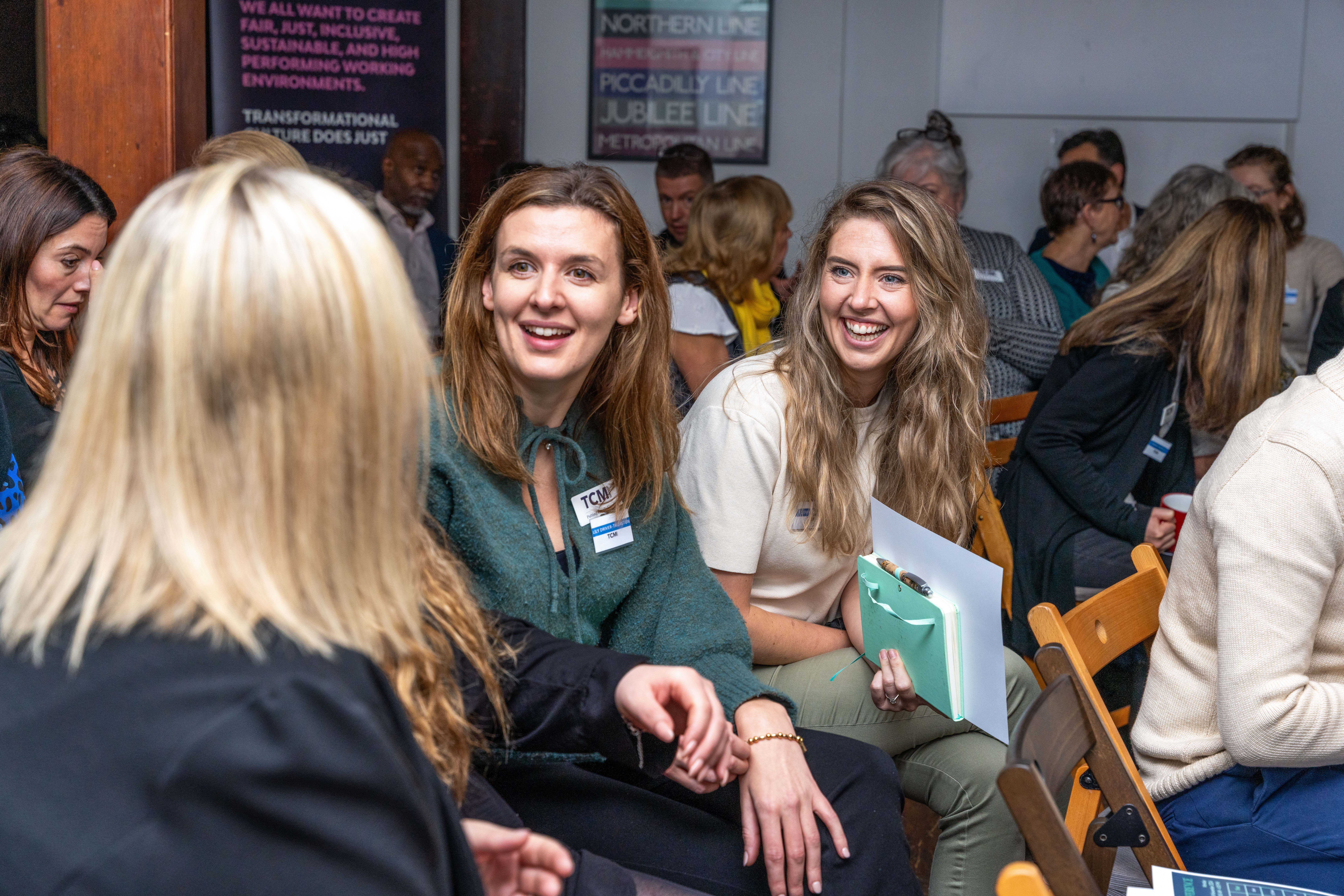
Share article:
Tags:
As The TCM Group heads stateside, David was joined by US colleagues and friends Merry Brown, Beth Myers and Colin Rule to discuss the power of managing conflict well and reframing the narrative. Here’s an insight into their conversation.
David Liddle
David Liddle is the Founder and CEO of The TCM Group, a consultancy that has been at the cutting edge of conflict resolution, culture change and leadership development for over two decades. David is the author of two books: Managing Conflict and Transformational Culture. Both David and TCM have accumulated many awards for their game-changing courage and success.
Merry Brown
Merry Brown hails from Tennessee and is a TCM accredited workplace mediator and consultant. She also owns her own business in workplace mediation, resolution and transformation; hosts a podcast called Conflict Managed; and is a Tennessee Rule 31 Civil Mediator.
Beth Myers
Beth Myers is a mediator, working in private practice for over a decade in two state court systems: Massachusetts and Maine. She’s been involved in volunteer work with a range of community and mediation programmes and has also worked closely with the government. Privately, she enjoys highly resolving highly complex family situations and multigenerational issues.
Colin Rule
Colin Rule is CEO of Mediate.com, a 27-year-old website that serves as a hub for mediation practice around the world. His three decades of expertise specialise in online mediation and dispute resolution.
A conversation between mediators
Beth
Mediation can be a difficult concept, particularly for organisations that might be doing well. Even along with what you think is a good culture, if you’re the employee feeling happy and harmonious with an ability to disagree with respect and curiosity, well, who’s really going to listen? Who cares? Is it colleagues that listen well with each other? Or is it bosses that listen well, to employees? What are some of those key elements that really drive that good culture?
David
A great question. One of the really most important fundamentals of culture, which also talks about the fundamentals of good conflict resolution, the ability to hear myself as well, because it’s very noisy. Sometimes I can’t even hear myself think so I want to be able to have a bit of time to connect with my own feelings and emotions. Part of it is about how I connect with me, but also how I hear you back and how I hear you, Mary and Colin and Matt and Natalie and everyone else, how do I hear what you’re saying? And to do that, as a manager, I have to give up power because power comes when all I do is talk, talk, talk.
Colin
I certainly have met a lot of managers in my career, that, you know, it was all threats and fear and pressure, and they thought that was the best way to get value out of their teams and they’re absolutely wrong. I love all of this; I am drinking this in through all of my pores.
But I will say, as a mediator and a conflict resolution guy, I can’t help but walk around and wear the conflict glasses. That’s what I look for in organisations. And everything is through the prism of conflict. Now, we know that at the heart of all conflict resolution is negotiation. That’s what it means to be a human: we negotiate every day, when you sit down with a co-worker to figure out what the plans are, what the strategy is, or how resources are going to be allocated, or who’s going to get hired. These are all negotiations. I think that there’s a way to think about an organisation as a group conflict situation and all the dynamics in there.
Now the problem with mediation traditionally, and I think people are starting to rebel against the notion of “dispute resolution” because, first of all, disputes implies a certain framing of a conflict between two individuals. And resolution implies that our goal is to solve all those disputes. What we’ve seen in the field is an evolution past that framing of dispute resolution to more conflict management. And again, a lot of what you’re talking about in workplaces really resonates with me, because we can’t just be reactive.
You know, there’s a lot of talk about high performing teams. Well, high performing teams aren’t turning on each other; they share a common goal, and issues arise. Sure, of course, if you’re in a high pressure and high delivery organisation, there’s going to be conflict, because you have to negotiate all the time about strategy and resources. But framing is great because it centres us back on what makes these healthy organisations. This connects to culture.
I also love the word culture. This means a lot in the mediation field; we have a lot of talk about cross cultural communication. There are many kinds of culture, even within an organisation: there could be political cultures, there could be religious cultures, there could be neighbourhoods, or there could be affiliation groups that can leave the culture. I think we need to think about culture in this very expansive way. In the conflict resolution field, most of the really tough conflicts that I’ve experienced have had culture as an element. Even if you’re talking about two people that come from the same hometown, they have different expectations about what’s appropriate, when there’s a dispute, and how to communicate, and how to handle these negotiations. A lot of what we do is to facilitate that cross cultural communication. And I love the idea of building a new culture. When we start an organisation, we’re going to set the culture for this team, and what choices are we making.
I love that a culture is defined by the worst behaviour that an organisation is willing to tolerate, or demonstrate, as you say, I’ve seen that so many times, because you can set an aspirational culture, but you’re tolerating that sales guy over there, who’s really aggressive with all of his co-workers, and demeaning to the people that he works with. You can say all these high minded things about what your culture is, but your actions are betraying a different value system. And again, this gets to me that we talk about this a lot in the negotiation field about distributive negotiations versus integrative negotiations, trying to find ways to expand the pie, find areas of common value, and common ways that we can add. That’s what an organisation can do, we all share an objective to achieve our mission.
This is the perfect time to come to the United States as the pandemic has completely changed workplace culture in the US. Teams are really trying to figure out what the new normal looks like.
David
If an organisation is struggling with resources, particularly “time poor” without the time to invest in mediation, what can they do about that?
Colin
One of the beauties of online dispute resolution is we can quantify the benefit. We have a number called Return on Resolution that we calculate for our clients. It’s like if you make an investment here, what return will you get in terms of your organisational performance, retention and brand loyalty. I think that the bean counters in particular, they can be very sceptical of what they call “the soft skills”. We need to be able to communicate in a dollars and cents way that this work is crucially important to you in achieving the objectives and case studies are a way to do that. The more data we have, the better, because that’s what convinces these managers. Fighting is not helping you achieve your objectives.
David
Let’s get to the MBAs, into the business schools, and go and show people the evidence of the need for change. Merry, what does that mean to normalise conflict and how would that work within an organisation where people may be fearful of conflict?
Merry
Conflict is normal and to be expected. I think part of the problem with conflict is that we see it as problematic. When we think about conflict, we think about unmanaged conflict. But what I really want to do is help people embrace that conflict is normal and to be expected. If we think that conflict is a sign that something’s going wrong, then something that we need to fix, but as I said, usually what we have in mind is unmanaged conflict. And according to The Society for Human Resource Management, toxic work environments cost us over $44 billion annually. That really shows that when we don’t manage conflict, there are real problems right from revenue haemorrhaging to unnecessary turnover. People leave because they don’t feel cared or valued. Unmanaged conflict leads to poor physical and psychological health. And we know stress is the killer. The psychological effects of unmanaged conflict can reign for years in people and can wreak havoc in organisations.
What we need to do to normalise conflict is if we expect it, then we should expect to manage it. When you manage conflict well, that leads to creative thinking and collaborative problem solving. It leads to greater workplace satisfaction and engagement and stronger teams. And somebody might say, well, that’s counterintuitive. How can conflict lead to engagement and stronger teams? Well, when you go through something with someone, when you do something that is difficult and come out on the other side, you’ve made a partner, you’ve got stronger bonds, a trust can develop, when you have real disagreement, but you’ve worked through it in a collaborative way, then you’re better off.That means that you have better services and products, a positive working atmosphere that brings along this good culture that we want.
Now that I know that conflict is here right now, and I’m going to have it in the future, then we can empower people to address it swiftly, justly and fairly. We can take advantage of the myriad benefits that are waiting for us if we manage our conflict.
David
Beth, what are your thoughts about how organisations who are serious about mediation and would like to use mediation can do this?
Beth
It’s all about communication and conversation: we ask people what their goals are for addressing those needs. Then we’re going to come together to see how we can work together to create a plan for moving forward. Conflict is going to tell you that there’s a need that’s unmet somewhere, or an opportunity that’s yet to be fully explored and you know, that conflict, it feels tough, but it is an opportunity. If an organisation makes the decision to use mediation, it’s going to be informed and it’s going to come away addressing fundamental needs; they’re going to have felt heard. Those are key elements to producing effective, productive workplaces.
David
The resolution revolution starts now. We can move from fear to flourish if we reframe conflict as an opportunity. These are the messages that we want to take into organisations and help to drive the discourse.
Yes, we know process has its place. But it shouldn’t be the only feature in the way we deal with culture as a system.
If you missed the conversation and you’d like to catch up, you can watch the full recording below:














